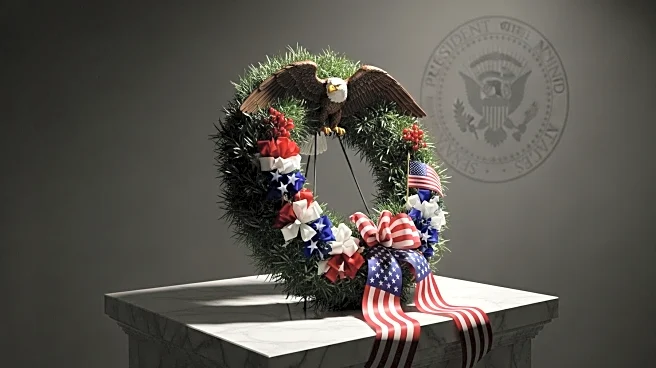What's Happening?
A memorial service for Charlie Kirk, a prominent conservative activist, was held in Glendale, Arizona, drawing tens of thousands of mourners, including President Trump and members of his administration. Kirk, who was assassinated while speaking at Utah Valley University, was remembered for his religious leadership and close ties to the Trump administration. The service featured speeches from high-profile guests such as Vice President JD Vance, Stephen Miller, Tucker Carlson, and Robert F. Kennedy Jr. Erika Kirk, Charlie Kirk's widow, expressed forgiveness towards the accused killer, emphasizing that 'the answer to hate is not hate.'
Why It's Important?
Charlie Kirk was a significant figure in conservative circles, and his assassination has sparked discussions on political violence and its impact on public discourse. The memorial service highlighted the deep connections between Kirk and the Trump administration, underscoring the influence of conservative activism on U.S. politics. The event also served as a platform for President Trump to address his political rivals, reflecting ongoing tensions between political factions. The gathering of influential figures at the service demonstrates the potential for continued mobilization of conservative supporters in the U.S.
What's Next?
The aftermath of Charlie Kirk's assassination may lead to increased security measures at political events and further discussions on political violence. The memorial service could galvanize conservative activists to continue Kirk's legacy, potentially influencing future political campaigns and policy discussions. The presence of key political figures at the service suggests ongoing support for conservative causes, which may impact upcoming elections and legislative priorities.
Beyond the Headlines
The assassination of Charlie Kirk raises ethical questions about the role of rhetoric in political violence and the responsibilities of public figures in fostering a safe political environment. The memorial service also highlights cultural dimensions, such as the intersection of faith and politics, and the ways in which personal forgiveness can influence public narratives. Long-term shifts may include increased scrutiny of political discourse and efforts to bridge divides between opposing factions.









